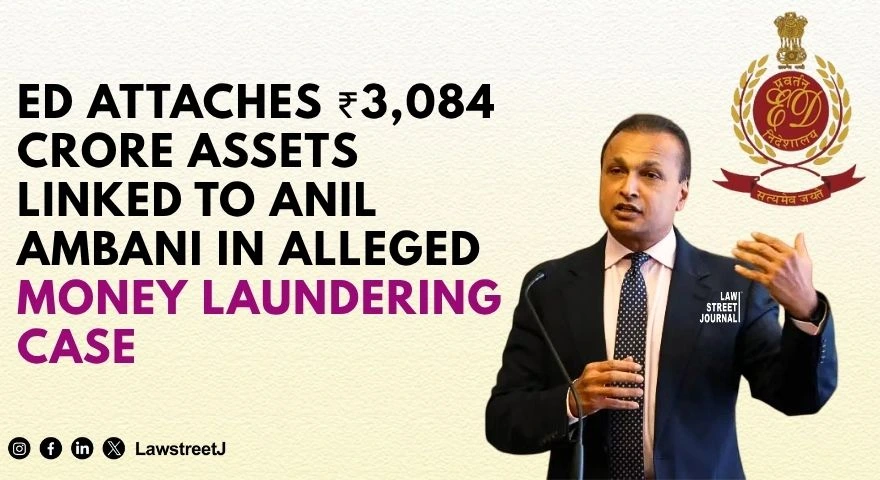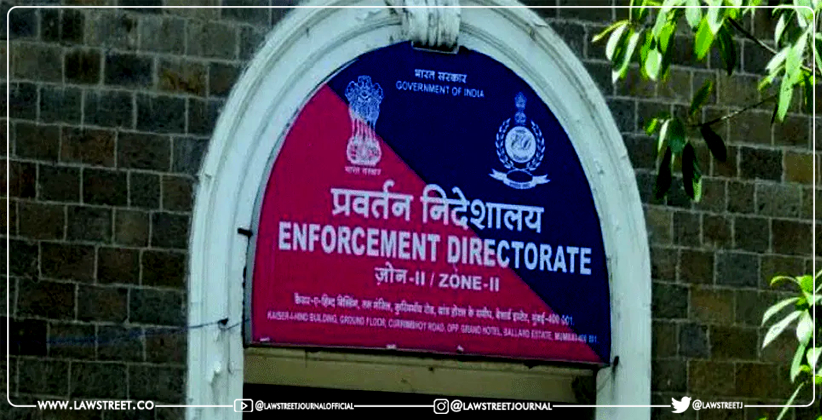New Delhi: The Enforcement Directorate (ED) has provisionally attached properties valued at ₹3,084 crore belonging to Anil Ambani, Chairman of the Reliance Group, in connection with an ongoing money laundering investigation. The action has been taken under the Prevention of Money Laundering Act (PMLA), 2002, following allegations of fund diversion by Reliance Home Finance Ltd. (RHFL) and Reliance Commercial Finance Ltd. (RCFL).
According to official sources, the ED issued four provisional attachment orders under Section 5 of the PMLA after identifying transactions indicating alleged diversion of public funds. Investigators found that money raised through borrowings by RHFL and RCFL was channelled through intermediary entities and shell companies instead of being used for its stated purpose.
The investigation, initiated on the basis of FIRs filed by the Central Bureau of Investigation (CBI) and inputs from other financial agencies, revealed violations of Sections 3 and 4 of the PMLA, pertaining to the concealment and use of proceeds of crime. The attached properties are being treated as assets representing the alleged laundered funds.
Scale and Spread of Assets
The assets attached by the ED include residential properties, commercial buildings, and land holdings in several Indian cities. Key among them are:
- Residential holdings: Ambani’s Mumbai residence at Pali Hill, his family property, and other luxury apartments.
- Commercial properties: The Reliance Centre in New Delhi, office spaces in Pune and Hyderabad, and other corporate assets.
- Land parcels: Plots in Noida, Ghaziabad, and Chennai, believed to have been acquired using diverted funds.
The cumulative value of these properties has been assessed at ₹3,084 crore. The ED clarified that the attachment is provisional and must be confirmed by the Adjudicating Authority under the PMLA before further legal action.
The money-laundering probe began in early 2023 after financial institutions flagged potential irregularities in the accounts of RHFL and RCFL. The Financial Intelligence Unit (FIU) later reported multiple suspicious transactions, prompting the ED to initiate a detailed inquiry. Raids were conducted in Mumbai, Delhi, and Pune, and statements from company executives and auditors were recorded. Forensic audits allegedly revealed funds being layered through a network of related entities to obscure the money trail.
The ED issued the provisional attachment orders on October 31, 2025, and made the details public on November 3, 2025. The attachment is meant to secure assets suspected to be linked to proceeds of crime until adjudication.
Legal Position and Corporate Response
Anil Ambani has not yet issued a public statement. Legal representatives of the Reliance Group are expected to challenge the attachment before the Adjudicating Authority. Under the PMLA, parties may contest ED orders and, if required, appeal before the Appellate Tribunal.
The ED’s investigation into RHFL and RCFL’s financial transactions is also being examined alongside the Yes Bank case, in which both entities were named among borrowers who allegedly received irregular loans. Officials are examining possible links between the cases to determine whether common networks or entities were used.
Under the PMLA, the ED can attach properties suspected to be acquired through criminal proceeds. A provisional attachment remains valid for 180 days and must be confirmed by the Adjudicating Authority; once confirmed, assets may be confiscated upon completion of trial.
The agency described this ₹3,084-crore attachment as one of the largest in recent years involving a major industrialist. With the attachment in place, the ED is expected to file a Prosecution Complaint—equivalent to a chargesheet—before the Special PMLA Court. The court will evaluate whether sufficient evidence exists to proceed with prosecution.
Meanwhile, the CBI’s separate investigation into alleged loan irregularities and fund diversion by RHFL and RCFL continues in parallel. Regulatory coordination between the ED, Reserve Bank of India (RBI), and Securities and Exchange Board of India (SEBI) also remains active, as authorities trace the financial trail and identify additional assets linked to the alleged laundering scheme.





![Calcutta High Court judge directs Supreme Court's Secy Gen to produce transcripts of his interview [Read Order]](/secure/uploads/2023/04/lj_1579_7e4dbb08-78fb-4ca1-9c70-c7173a6c80a9.jpg)




